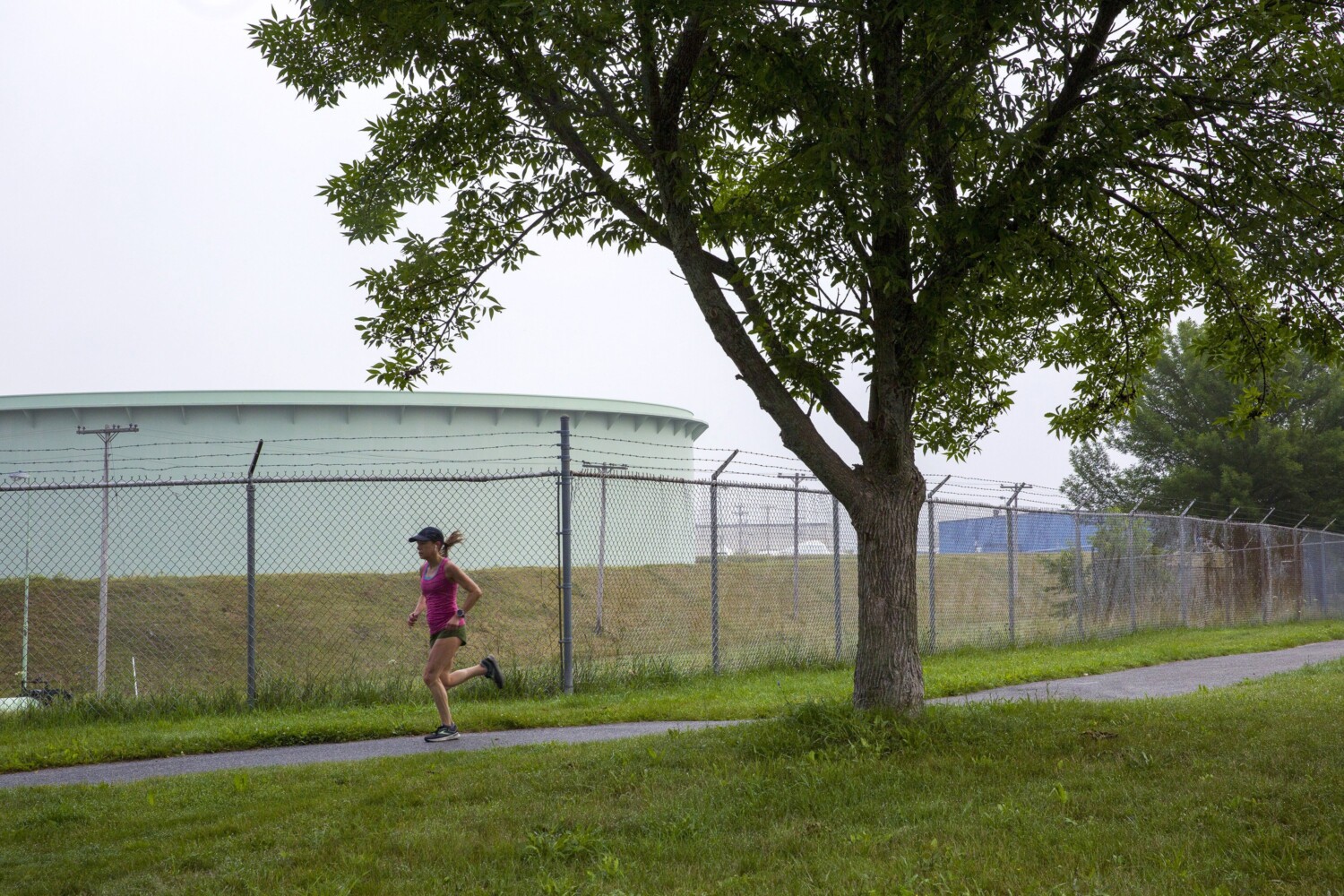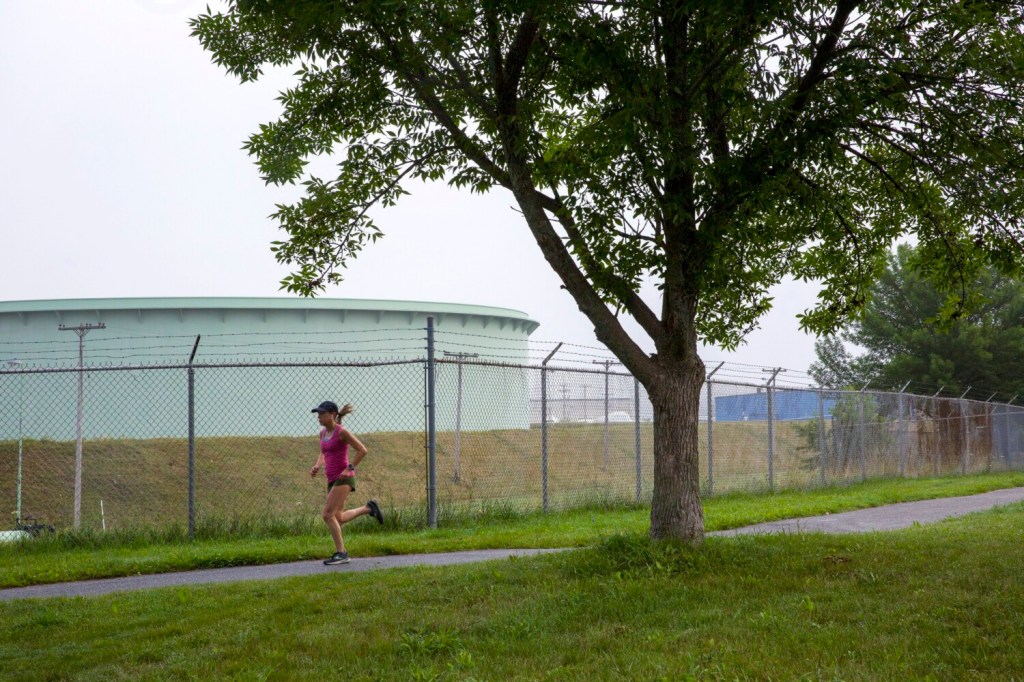 A runner on South Portland’s Greenbelt Pathway passes an oil tank in South Portland. in 2021. (Michele McDonald/Staff Photographer)
A runner on South Portland’s Greenbelt Pathway passes an oil tank in South Portland. in 2021. (Michele McDonald/Staff Photographer)
SOUTH PORTLAND — It’s the worst-kept secret in the city.
Although nothing official has been announced, Portland Pipe Line Corporation is expected to sell its holdings any day now, a development that would end its long and sometimes fraught relationship with the city and open up new possibilities to reimagine the land.
The pipeline, a subsidiary of the Canadian oil company Suncor, owns more than 200 acres scattered across several parcels and is among the city’s largest landowners. Its assets include a 100-acre tank farm near the high school and four tanks and two piers by Bug Light Park that have been viewed both as eyesores and environmental hazards.
The assessed value of the land is $38 million, but the city estimates it could be worth more than $100 million if the tanks were removed and the land cleaned up, according to a letter it sent last month to Suncor. Most of the tanks are out of service because of waning demand anyway.
Suncor sent a two-sentence acknowledgement that it received the letter but has otherwise been silent, which has frustrated officials. Neither Suncor nor pipeline officials responded to repeated requests for comment for this story.
“There’s no excuse for this super secrecy.” said Councilor Natalie West.
City leaders have been urging Suncor to voluntarily divest its holdings, remediate the land prior to any sale and then work with the city to transform these industrial parcels into a “vibrant, mixed-use district consistent with community values.”
Last month’s letter was designed to signal to residents that the city is aware of what’s going on with the pipeline but also looking for answers and a clearer timeline.
Mayor Richard Matthews also sent a letter this week to the Maine Department of Environmental Protection, which is reviewing the pipeline’s license renewal. He stressed that the city wants to “remain informed and involved,” in any redevelopment, specifically “for productive uses other than petroleum transport and storage.”
The council sent a similar letter in January, urging the DEP to accept a voluntary agreement from the corporation to decommission its out-of-service tanks.
West said, as far as she knows, no oil company seems interested in the land. She speculated that any buyer would likely split the holdings up and sell to different developers, a process city leaders hope to be involved in. One parcel the city is particularly interested in is the parcel across from the historical society building at Bug Light Park that overlooks Casco Bay.
All of the councilors voted in support of the recent letter except Linda Cohen.
“There are a lot of people in the community who do not support us interfering with anything that any of the businesses are trying to do in the city,” she said.
A CITY LANDMARK
There was a time when the 236-mile pipeline and corresponding tanks were the pride of South Portland. When it was built in 1941, oil flowed from Ferry Village to Canada to assist in war efforts, a much safer option than sending tankers through U-boat infested waters.
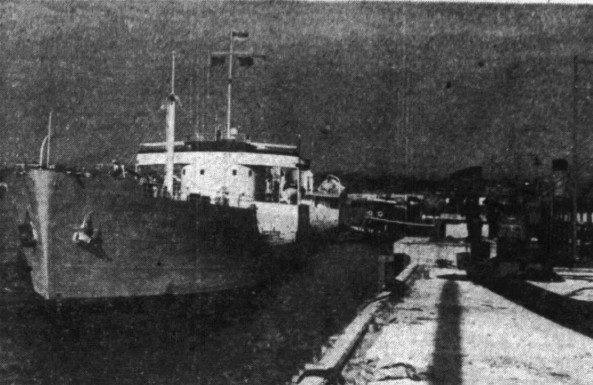 On October 31, 1946, a Norwegian tanker brought 85,000 barrels of Aruba crude oil to through the new Portland Pipe Line pier. (Evening Express archives)
On October 31, 1946, a Norwegian tanker brought 85,000 barrels of Aruba crude oil to through the new Portland Pipe Line pier. (Evening Express archives)“Everyone was very patriotic at the time,” said Kathy DiPhilippo, the executive director of the South Portland Historical Society. “This was just yet one more war effort.”
Crude oil continued to be a major industry for the city. The pipeline created jobs and assisted the city on local projects, DiPhilippo said. Portions of the Greenbelt Pathway now pass over pipeline land, and the corporation painted its tanks green after local baseball teams complained about not being able to see flying balls along the backdrop of the bright white tanks.
The relationship started to sour about a decade ago.
In 2014, the City Council passed the Clear Skies ordinance, banning the export of Canadian tar sands oil from the city’s waterfront for environmental and public health reasons. The ordinance also effectively prohibited the potential reversal of flow of the pipeline that historically delivered oil from South Portland to Canada.
“As time went on and we learned more about pollution, we learned that the reversal of the flow of the pipeline would have a potential negative effect on the health of our citizens,” said Sue Henderson, a city councilor at the time.
The pipeline filed a lawsuit to overturn the ban. It also applied for a property tax abatement, blaming the ordinance for reducing the value of its assets.
The six-year legal battle that followed cost the city nearly $3 million in fees — including $174,529 that was covered by resident donations. In 2021, the pipeline agreed to voluntarily dismiss its appeal, giving up the right to pursue its appeal further in the future.
TOSS THE TANKS?
Tim Honey, a former city manager of Portland, moved to South Portland when the Clean Skies ordinance battle began and soon became fascinated with the tanks.
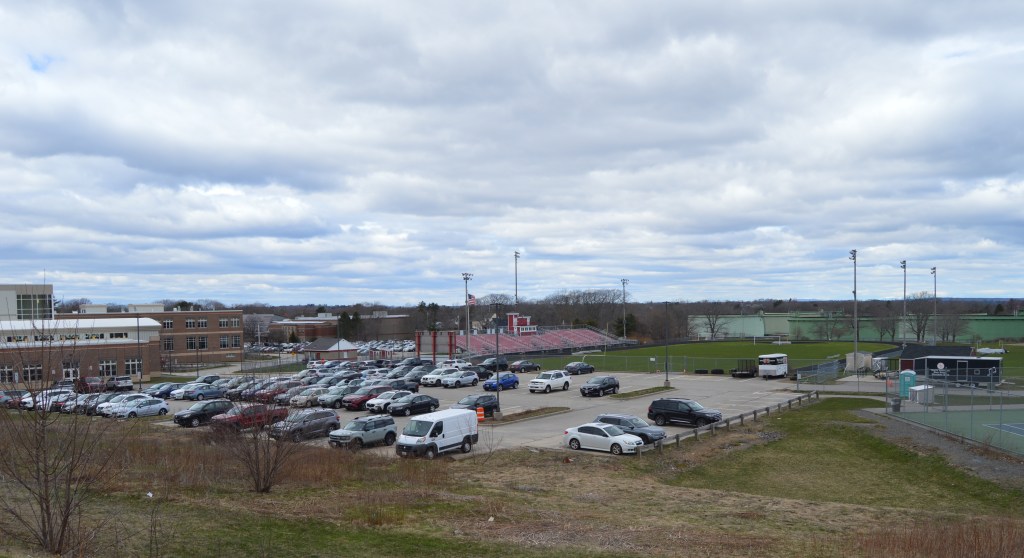 South Portland High School, left, and its athletic facilities are adjacent to the Hill Street Tank Farm, along with an elementary school and residences. (Drew Johnson/Staff Writer)
South Portland High School, left, and its athletic facilities are adjacent to the Hill Street Tank Farm, along with an elementary school and residences. (Drew Johnson/Staff Writer)“They were everywhere and not being used,” he said. He started taking his neighbors on “tank tours,” walking around the massive cylinders of steel and discussing their history.
Honey also went door to door and spoke with people at the polls on election day last year. Of the 350 people he talked to, he said 84% of the people wanted the tanks out.
“I’m not worried about whether there’s public support for this,” he said. “There is.”
He launched his “Toss the Tanks” campaign this spring, calling for their removal and remediation of the land, specifically the 100-acre Hill Street tank farm near the high school and residential areas.
The campaign also involves imagining what the land could become, consistent with the city’s comprehensive plan.
“I live in that neighborhood,” said Councilor Misha Pride. “I see those tanks when I walk my dog. I hope it will be something else.”
At a community forum in April, SMRT Architects shared a plan to remove the 19 above-ground tanks and build a walkable neighborhood complete with a high-density core, green space and lower-density periphery. The rendering included paths and roadways to lessen the pressure on Broadway, an already overburdened artery.
Housing would likely be a mix of apartments, condos and single-family homes but could provide more than 1,000 units for the city, something it sorely needs, said Mike Hulsey, executive director of the South Portland Housing Authority.
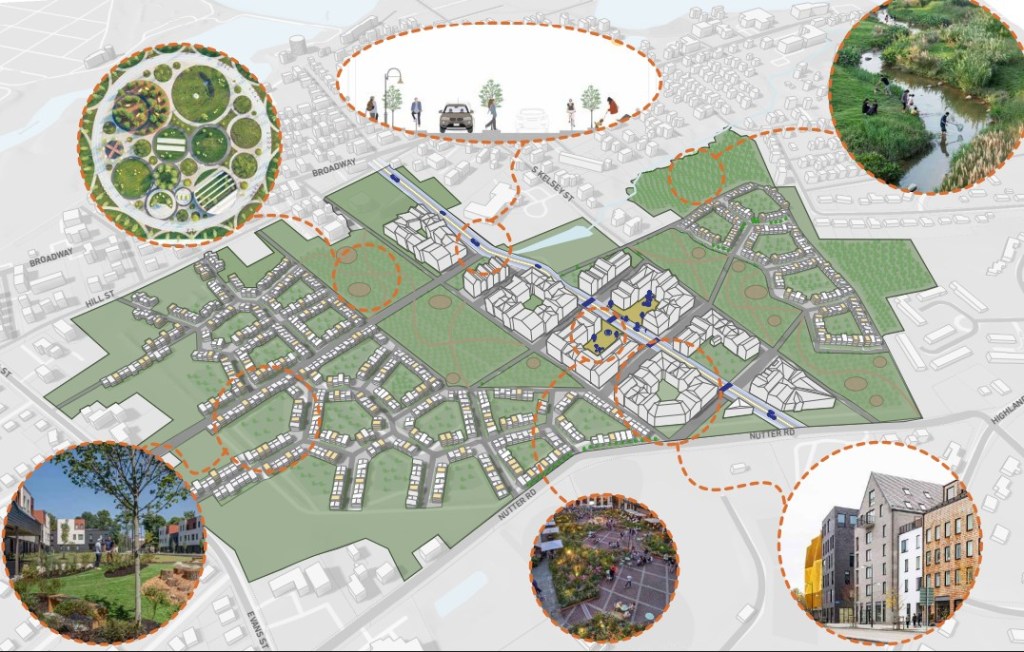 SMRT Architect’s conceptual rendering for development on what is now a 100-acre tank farm. (Courtesy of Toss the Tanks)
SMRT Architect’s conceptual rendering for development on what is now a 100-acre tank farm. (Courtesy of Toss the Tanks)The rate of housing demand averages 54 year-round units per year, according to a 2022 city assessment. That’s double the growth rate of 27 vacant units per year.
Hulsey said the authority would be interested in building affordable housing or teaming up with another developer to build workforce or market-rate housing. As a nonprofit developer, South Portland Housing also would be eligible for grants through the DEP and the EPA to support property cleanup.
“I’ve dreamed about it,” he said. “I always have. It’s right there, but it’s also far away.”
CHANGE STILL A LONG WAY OFF
Not everyone is excited about the prospect of adding major housing projects to the area.
Charlie Thieme, who has lived in South Portland for more than a decade, thinks the pipeline is a great neighbor. They pay their taxes, he said, and “they don’t ask much in return from the city.”
He doesn’t mind the tanks either.
“I haven’t noticed an odor from them,” he said.
New housing units would increase the demand of city services and create more traffic, something that he worries would outweigh the increase in tax revenue from an active development.
“Are they going to build a city park or a playground for the kids?” Thieme asked. “The city tends to be focused on building living space, and there doesn’t seem to be much thought about the repercussions.”
Before the land could be repurposed, the pipeline would have to take a number of steps to close the oil storage facility, per DEP protocol.
The pipeline would have to remove all of the oil, oil residuals and containment systems, as well as the pipes buried beneath its land. Further, the pipeline would need to hire an independent researcher to assess the levels of contamination in the soil and water to determine if the land is suitable for residential or commercial use.
The last contamination evaluation was in 1992 and found “no known or anticipated soil, groundwater or surface water impacts at any of the four discrete areas.”
Still, because the tanks have been there so long, “there’s probably some environmental concerns,” said Matthews, the mayor.
That means even if a sale goes through, it could be years before any transformation of the neighborhood happens.
That hasn’t stopped some residents from speculating as they wait.
Ellie Chatto, who has lived in South Portland for 64 years, grew up near the tanks and still remembers the smell of the crude oil.
“It was so strong it burned your nostrils,” she said.
The harbor used to be dotted with tankers coming in and out. Now, she sees the city at a crossroads.
Chatto wants the 100-acre tank farm around the corner from her house to be transformed into a green, recreational space. It’s an opportunity to follow in the footsteps of the Greenbelt, she said, to transform something that’s not being used anymore into something that’s positive for the city.
